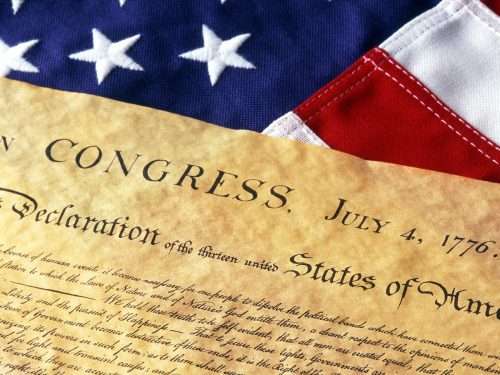“And for the support of this Declaration, with a firm Reliance on the Protection of
divine Providence, we mutually pledge to each other our Lives, our Fortunes, and our
sacred Honor.” Action of the Second Continental Congress, July 4, 1776

By Frankie S. Anderson, nationally known Lecturer, Educator, and Speaker for We Can Be Heroes Foundation. Frankie Anderson is listed in our Speakers Directory here. Permission to share this writing in its entirety has been granted.
Someone wrote: “Some of the signers of the Declaration of Independence did lose their lives, and the lives of their family members, and some died financially broke and spiritually broken, but not one man lost his sacred Honor! There was not a traitor- not a coward among them.”
Who were these signers, these 56 men in Congress assembled (July 1776) who represented some two and a half million free American citizens? John Hancock would write that they were men of fortune, ability, learning, eloquence, and acuteness. The historical record will support that the motives of these men were primarily moral, ideological, and patriotic.
These most remarkable revolutionaries ever assembled, wearing silken stockings, powdered wigs, velvet breeches, and brilliant, colored coats. They were lawyers, jurists, doctors of medicine, and a divine Rev. John Witherspoon. They were career politicians, land owners & merchants. Most were young: 18 were in their thirties, 3 were in their twenties, and many had infant children. The only really old men among them were Benjamin Franklin and Stephen Hopkins.
Did these great men know that after having appealed to the Supreme Judge of the World for the protection of the United States of America, an eight-year war, The American Revolution, would follow? The struggle was appalling; the dangers & deprivations great, and the victories were few; the successful victory: miraculous (Federalist #37).
Now, let us recall and repeat the lessons from the lives of this founding generation whose noble qualities of dignity, patriotism, courage, and sacrifice enabled them to secure for us {U.S.} – the blessed inheritance of the free institutions of government we now enjoy –but – must continually defend.
Caesar Rodney – Delaware– {His image is on the new quarters.] He arose from a sick bed and rode 80 miles in a thunderstorm, having been told the Delaware delegation was not going to vote for the Declaration. He arrived at Independence Hall just as his delegation was called & cast the deciding vote. The price he paid: Signing the Declaration cost him the help of the medical doctors in England who could have helped him with the cancer eating away on his face.
Francis Lewis – New York– After he signed the Declaration of Independence, his wife was taken captive by the British and held for two years. When he was told she would be released if only he would take his name off the Declaration, it was Mrs. Lewis who refused that offer. She was eventually released but died shortly after that due to the horrible treatment she had received at the hands of the British.
Abraham Clark-New Jersey – After he signed the Declaration, two of his sons were taken captive by the British and held for two years on the infamous, terrible torture ships. Mr. Clark and his sons lived two years, knowing if he would just take his name off the Declaration, his sons would be set free. They were eventually released and became great Americans in service to their country.
Rev. John Witherspoon-New Jersey – Barely escaping with his life and the lives of his large family, the British soldiers burned his house and library to the ground after he signed the Declaration. From a sermon he preached on May 17, 1776: “He is the best friend to American liberty who is the most sincere and active in promoting true and undefiled religion. Whoever is an enemy of God, I scruple not to call him an enemy of his country.”
The sacrifices of two women long forgotten:
Margaret Corbin went with her husband to Ft. Washington to be a cook and a laundress. Her husband was mortally wounded, and she took her place at his gun. She was wounded in the battle. Her arm was almost severed from her chest, but she did survive. There is a monument to her memory at Ft. Tyron, New York, which reads:” Margaret Corbin -The First American woman to take a soldier’s part in the War for Liberty.”
Mary Hayes (Molly Pitcher) – In June 1776, during the Battle of Monmouth, men were fainting from the heat. Molly Pitcher would bring them water from the river. Her husband was mortally wounded in the battle, so she took his place at the cannon and continued firing. She was presented to General George Washington the next day and was given half Officer’s pay for the rest of her life.
The First and Last Signers to die:
John Morton – Pennsylvania. (First Signer to die- not directly from the war.) Educated at home by his father, he became an associate judge to the Pennsylvania Supreme Court. His State had sent Morton to vote NO to Independence. He was a man of Christian conscience, however, and after much inner struggle, he voted YES and signed the Declaration. When he returned home, he was treated as an outcast and a traitor. Deserted by most of his family and friends, he died within the year after having signed the Declaration. Scholars believe he died, literally, of a broken heart. History books say that from his deathbed, he said: “Tell them that they will see the hour when they shall acknowledge it to have been the most glorious service I have ever rendered my Country.“
Charles Caroll of Carrollton – Maryland. (Last Signer to die.) Mr. Carroll gave vast amounts of his own personal fortune to the Revolutionary War. At the age of 89, he was asked to sign a copy of the Declaration for posterity. Signing, he wrote this statement: “Grateful to Almighty God for the blessings which, through Jesus Christ our Lord, he has conferred on my beloved country and her emancipation, in permitting me…to live to an age of 89 years, and to survive the fiftieth year of Independence, adopted by Congress on the 4th day of July 1776, …and of which I am now the only surviving signer, I hereby recommend to the present and future generations the principles of that important document as the best inheritance their ancestors could bequeath to them, and pray that civil and religious liberties they have secured for my country may be perpetuated to remotest posterity and extended to the whole family of man.”
The true wonder-the true story of the American Revolution has been all but expunged from modern history and school books! This paper celebrates the 247th Birthday of the United States of America. Hopefully, all who read it will: 1. Remember & reverence the blood, toil & sacrifice evidenced by our Founding Generation in establishing the United States of America. 2. Read and study –this July 4th– the Declaration of Independence and supporting American History. 3. Restore what President Washington called (in The Farewell Address) the just pride of patriotism, for this is our heritage as Americans. 4. May we always remember and reflect reverently, on what happened to our nation on September 11, 2001. Perhaps we, the present American generation, will resolve that we now have requisite reasons to pledge to each other — our lives, our fortunes & our sacred honor…in defense of our American liberty. Happy Birthday, America: July 4, 2023.
Q – What do you mean by Revolution?”
A – “A revolution means some great change of government, and we ought to ever remember ours with ardent gratitude to God for so great a blessing and with lasting love and reverence for those good, and wise, and brave men, who went through such dangers and sufferings that their country might be free.” Arthur J Stansbury in his Elementary Catechism of the Constitution/ 1828
The Federalist Papers #14: “Had no important step been taken by the leaders of the Revolution for which a precedent could not be discovered, no government established of which an exact model did not present itself, the people of the United States might, at this moment, be numbered among the melancholy victims of misguided councils, must at best have been laboring under the weight of some of those forms [of government] which have crushed the liberties of the rest of mankind. Happily for America, happily we trust, for the whole human race, they pursued a new and a more noble course. They accomplished a revolution that had no parallel in the annals of human society. They reared the fabrics of government which have no model on the face of the globe.” James Madison
Can You Answer these questions from the Declaration of Independence?
- What were the “Self-evident truths”?
- What are three listed “unalienable rights”?
- What is an unalienable right?
- Why were governments instituted among men?
- From where do governments derive their power to govern?
- If a government becomes destructive, what do the people have a right to do?
- To whom did Jefferson say they appealed for justice in their cause and for their protection?
- King George III had become a _____________; therefore, he was unfit to govern a __________people.
- Name & discuss the abuses of civil power committed by the king.
- Why did John Hancock sign his name so largely?
Written by nationally known Lecturer Frankie S. Anderson with permission to share in its entirety.
Click here for Frankie S. Anderson in the We Can Be Heroes Foundation Speakers Directory.
Sources: Sources: The Story of the Declaration of Independence, University Press, 1954; Heroines of the American Revolution, America’s Founding Mothers, Diane Silcox-Garrett, 1998; Greatness to Spare, Van Nostrand, 1965; Christian Life and Character of the Civil Institutions of the United States of America, Benjamin Franklin Morris, 1865.
